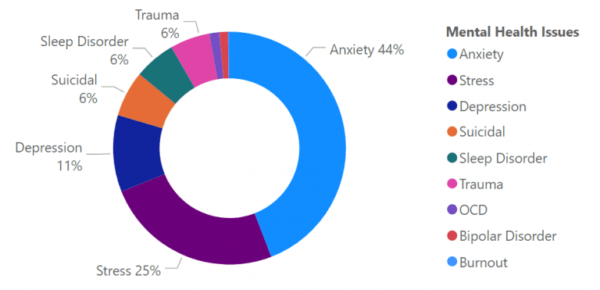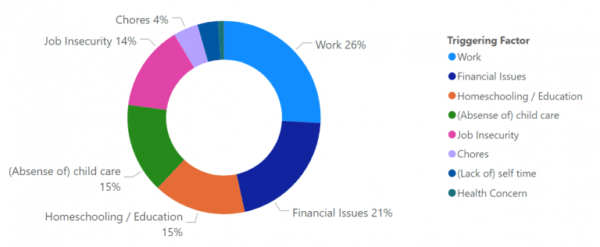With the prolonged lockdown and isolation, parents are incessantly juggling between work, childcare, home-school and chores. Accumulated stresses with no end in sight are taking tremendous toll on the mental health of parents.
Between working from home, guilt about not home schooling my kids, grief from loosing my grandmother in law this week, workload increasing, and anxiety about the current state of the world, I’m not doing ok.
To shed some light on the struggles of parents during this difficult time, we tuned into their conversations on Twitter[1]. The analysis shows an alarming picture and brings us to think what we can do for our friends, colleagues and ourselves who have children at home.
The mental health crisis of parents is prevailing and alarming
Nearly one in ten Tweets from parents has mentioned mental health issues. Compared to the general population, parents talk about Anxiety much more often in their Tweets, followed by Stress and Depression. Alarmingly, 6% of mental health related Tweets from parents have mentions of Suicidal Thoughts.

Share of voice of mental health issues in Covid-19 related Tweets from parents
Burnout is though not directly mentioned very often, parents are expressing a range difficult feelings and emotions which indicate symptoms or onset of burnout.
 Wordcloud of negative feelings and emotions expressed by parents
Wordcloud of negative feelings and emotions expressed by parents
Parents are being asked to do the impossible to deal with the current situation. By analysing the concurrent topics mentioned along with their mental health issues, we attempt to get a glimpse into their incessant stress and triggers of crisis.
A range of factors are mentioned from work and financial issues, over homeschooling and childcare, to chores, lack of self-time and health concerns. Work is single most mentioned trigger – indicating the tremendous struggle of working parents.

Topics mentioned in mental health related Tweets from parents
More understanding, kindness, and support for working parents
It is nearly impossible to imagine the level of stress and struggles of working parents if we ourselves are not. Yet as working colleagues, we may want to check in on the wellbeing of our co-workers with children at home, especially when we receive their emails in the evening or in the night. An empathetic ear and more tolerance may just help them get through another day a bit easier.
Companies should find ways to relieve stress and avoid burnout by providing flexible working hours and reducing the expectations from employees during these challenging times. Setting up a support system or covering mental health support in forms of online psychological support or counselling will further protect the wellbeing of their employees.
If you are a working parent, here are some suggestions by our colleague from her experience as a working mom:“be more aware of the time spent, put a limit to the working hours on computer and know where to stop or have regular breaks and don’t put too much self-pressure on ourselves to be more productive as imposed by social media and other resources.”
Communication is key during these times. If you are feeling exhausted, don’t be afraid to reach out to a friend, to a helpline, your GP or to your manager.
A special thanks to the working moms who have contributed to the article: Ozlem, Jasmina and Elza.
[1] The data include over 35 thousand Covid-19 related Tweets in English with mentions of terms indicating the parental status of the author (e.g. “my kid”) from 15 March to 15 May.
Symanto is dedicated to improving mental health by harnessing the psychology AI. We are currently developing a virtual assistant solution to help employees better understand their mental wellbeing and receive personalised supporting resources. If you are interested in becoming an early adopter and helping us shape the solution, please don’t hesitate to reach out to us.
To understand more about the impact of Covid-19 on our mental health, explore our real-time mental health tracker and our webinar, where we focus on the general population in multiple countries.

